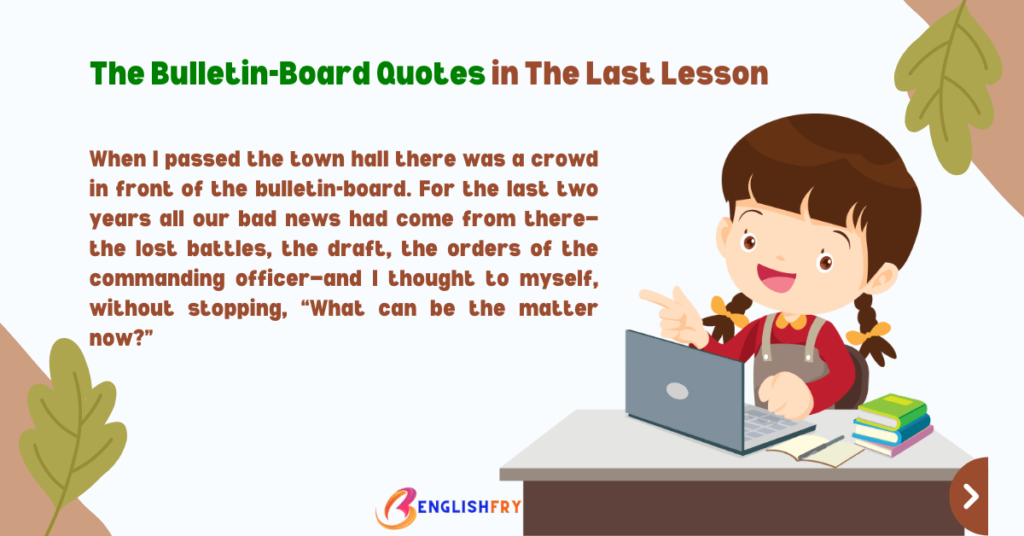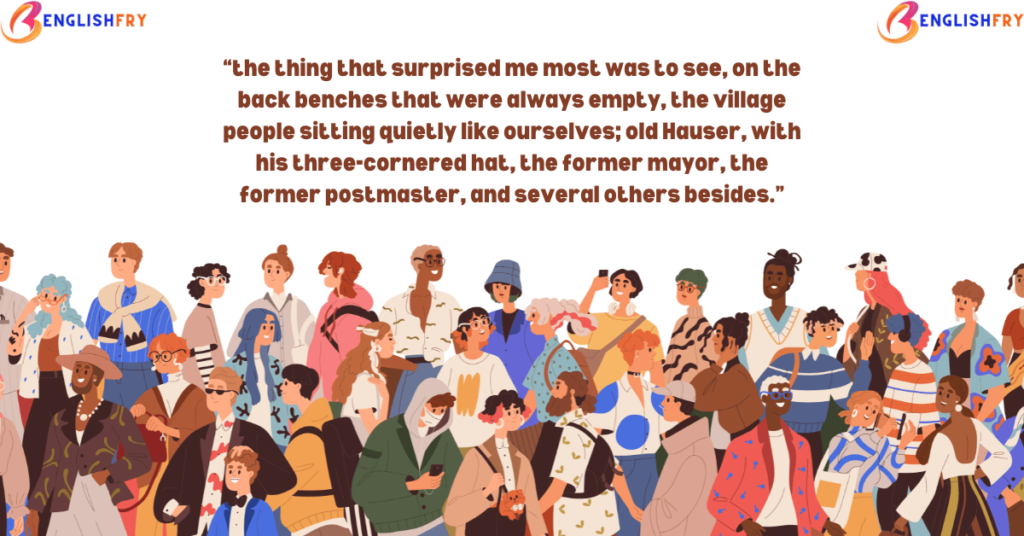Table of Contents
ToggleAbout The Author
Disclaimer: No other website can provide you all details on The last lesson Summary Explanations Question and Answers
Alphonse Daudet was a French short-story writer and novelist, now remembered chiefly as the author of sentimental tales of provincial life in the south of France. He was born on May 13, 1840 at Nimes in France. He was the son of a silk manufacturer. In 1849 his father had to sell his factory and move to Lyon. Alphonse wrote his first poems and his first novel at age of14. He died on Dec. 16, 1897 in Paris, France.
Today, we’re going to delve into the prose piece titled “The Last Lesson” by Alphonse Daudet. This story is set during the Franco-Prussian War in 1870-1871, a time when France was defeated by Prussia, which later became part of modern-day Germany. The narrative unfolds in the French districts of Alsace and Lorraine, which have now fallen into Prussian hands. The events take place against the backdrop of significant historical and political changes.
Let’s break down the text to understand the characters, context, incidents, and themes.
Characters
- Franz: The protagonist and a student in the story.
- M. Hamel: The teacher, who plays a crucial role in the narrative.
- Wachter: The blacksmith who gives Franz a piece of advice.
- Hauser: An old man from the village who attends the last lesson.
Context and Plot
- The story begins with Franz, the main character, fearing a scolding from his teacher, M. Hamel, for being late to school.
- The town is filled with a sense of unease, and there’s a crowd gathered in front of the bulletin-board, where bad news has been regularly posted.
- The announcement on the board reveals that the French districts of Alsace and Lorraine are now under Prussian control, and there will be a change in the language taught in schools.
- Franz reflects on his reluctance to learn, and as he enters the classroom, he realizes that it’s not an ordinary day.
Important Lines
“I started for school very late that morning…”
- Sets the tone and introduces Franz’s character.
“The lost battles, the draft, the orders of the commanding officer…”
- Establishes the context of war and the impact on the town.
“My children, this is the last lesson I shall give you…”
- Marks a significant turning point in the story, revealing the change in language instruction.
“Every day we have said to ourselves, ‘Bah! I’ve plenty of time. I’ll learn it tomorrow.'”
- Highlights the procrastination and realization of the importance of learning.
“The French language, saying that it was the most beautiful language in the world…”
- Introduces the theme of the importance of language and culture.
“Vive La France!”
- M. Hamel’s powerful declaration on the blackboard, symbolizing resistance and patriotism.
“School is dismissed — you may go.”
- Concludes the story with a poignant moment of farewell.
Themes
Loss and Change: The loss of the French districts and the change in language instruction represent a broader theme of loss and upheaval due to war.
Patriotism: M. Hamel’s love for the French language and his symbolic act of writing “Vive La France!” on the blackboard emphasize the theme of patriotism.
Regret and Reflection: The characters, especially Franz, reflect on missed opportunities to learn and regret not valuing their education earlier.
- Linguistic chauvinism: Linguistic chauvinism is the idea that one’s language is
superior to that of others. The narrative emphasizes the emotional and cultural impact of imposing a different language on a community, seen as an attempt to sever their connection with their culture. The language of a country is not just a means of communication but a source of pride, defining its culture, people, literature, and history. In ‘The Last Lesson,’ the people of Lorraine and Alsace become victims of linguistic chauvinism as they are compelled to learn German.
In summary, “The Last Lesson” is a narrative that beautifully captures the impact of historical events on individuals, emphasizing the significance of language, culture, and the consequences of procrastination. As we explore the text further, pay attention to the emotions of the characters and how the author uses language to convey the deeper meaning of the story.
Symbol Analysis

The Bulletin-Board
The Bulletin-Board
The bulletin board outside the town hall shows the oppression of the Prussian occupiers who have invaded the region of Alsace-Lorraine, which includes the village where the narrator, Franz, lives. Franz informs the reader that the board was responsible for all of the village’s bad news during the two years of Prussian control. There, foreign occupiers issue draconian edicts and instructions.
On the day the narrative takes place, a crowd has gathered around the board, reading a fresh announcement. Only after coming at school and hearing M. Hamel’s unexpected statement that this will be the last lesson in French does Franz realize that this must have been the new Prussian regulation put on the board.
As so, the board represents the authoritarianism of the Prussian occupants, who limit the freedoms of the French people day by day. At the end of the novel, the bulletin board is contrasted with the blackboard, an educational tool that M. Hamel and his students have access to, and which the teacher uses to inscribe and affirm his and the villages’ deep feeling of patriotism and resistance.

The Blackboard
At the end of the last lesson, M. Hamel writes “Vive la France!” (“Long live France!”) on the blackboard, symbolizing the force of patriotism and resistance. The location of the blackboard within the classroom alludes to the relationship between education and resistance. The blackboard symbolizes resistance via education, and also echoes the story’s overall emphasis on language and communication as tools of both liberation and tyranny. The words written on the board by the teacher value freedom and autonomy. They are a blatant denial of the demands of the Prussian occupiers, who have invaded and laid their claim to the French province of Alsace-Lorraine, where the drama is set.
The fact that the teacher writes these words on the blackboard is essential because it recalls and contrasts with the bulletin board seen by Franz at the start of the story. While the bulletin board depicts the oppression of the Prussian occupiers, who post their limiting orders there, the blackboard serves as a space of liberty, where M. Hamel—and the villagers—can declare their resistance and patriotism in the face of foreign invasion.

The Classroom
The classroom where the narrator, Franz, gathers with other students and locals to hear M. Hamel’s final lesson exemplifies the power of education. The chalkboard is positioned there, and the blackboard itself is a symbol of resistance via education, as reflected in the subversive message inscribed on it by M. Hamel at the end of the story, “Vive La France!” Thus, M. Hamel instructs the assembled audience not only in the French language, but also in patriotism and resistance, within the confines of the classroom.In this perspective, the classroom where the lecture takes place represents education’s ability to develop dedicated French citizens, citizens who can survive foreign control of their Alsace-Lorraine region by clinging to their French cultural values and identity.

The Last Lesson Summary
“The Last Lesson” by Alphonse Daudet is a poignant narrative set during the Franco-Prussian War in 1870-1871. The story revolves around Franz, a student, and his teacher, M. Hamel. As France loses the districts of Alsace and Lorraine to Prussia, the authorities decree that only German will be taught in schools. Franz, initially worried about a scolding for being late, discovers that it is, in fact, his last French lesson.
M. Hamel, dressed in his best attire, reveals the heartbreaking news to the class. The atmosphere in the school is somber as the villagers, including old Hauser, attend the final lesson. M. Hamel imparts a passionate message about the beauty and importance of the French language. He writes “Vive La France!” on the blackboard, symbolizing resistance, patriotism, and a final farewell.
The story explores themes of loss, change, patriotism, and the consequences of procrastination. Through the characters’ reflections, it highlights the impact of historical events on individuals and the value of preserving language and culture. The narrative concludes with M. Hamel dismissing the class, marking the end of an era for both the teacher and the students.

The Last Lesson MCQ
1. What historical event serves as the backdrop for “The Last Lesson” by Alphonse Daudet?
a) World War I
b) The French Revolution
c) The Franco-Prussian War (1870-1871)
d) The Hundred Years’ War
Correct Answer: c) The Franco-Prussian War (1870-1871)
2. Why is Franz afraid and in a hurry as he heads to school?
a) He is late for a test.
b) He fears a scolding from M. Hamel.
c) He wants to play with his friends.
d) He is excited about the upcoming lesson.
Correct Answer: b) He fears a scolding from M. Hamel.
3. What significant change is announced on the bulletin-board in the town?
a) Change in leadership
b) Language instruction switch to German
c) Educational reforms
d) Victory in a battle
Correct Answer: b) Language instruction switch to German
4. What does M. Hamel write on the blackboard during the last lesson?
a) A farewell message to the students
b) Mathematical equations
c) “Vive La France!”
d) German phrases
Correct Answer: c) “Vive La France!”
5. Why do the villagers, including old Hauser, attend the last lesson?
a) They want to learn French.
b) They are nostalgic about their school days.
c) To honor M. Hamel for his years of service.
d) They are curious about the new teacher.
Correct Answer: c) To honor M. Hamel for his years of service.
6. In the story, what is the significance of the town hall’s bulletin-board?
a) It announces upcoming events in the town.
b) It posts news about lost battles and war updates.
c) It provides information about school holidays.
d) It advertises local businesses.
Correct Answer: b) It posts news about lost battles and war updates.
7. Why is M. Hamel wearing his beautiful green coat, frilled shirt, and embroidered cap on the day of the last lesson?
a) It’s a special occasion, like an inspection or prize day.
b) He always dresses formally for teaching.
c) It’s a tradition in the town.
d) He wants to impress the students.
Correct Answer: a) It’s a special occasion, like an inspection or prize day.
8. How does Franz feel when he realizes that the last lesson is about participles, a topic he is not familiar with?
a) Excited and eager to learn
b) Indifferent and uninterested
c) Anxious and fearful
d) Confident and prepared
Correct Answer: c) Anxious and fearful
9. What is the symbolic significance of M. Hamel’s act of writing “Vive La France!” on the blackboard?
a) It signals the end of the school day.
b) It represents resistance and patriotism.
c) It introduces a new French lesson.
d) It is a farewell message to the students.
Correct Answer: b) It represents resistance and patriotism.
10. Why does M. Hamel say, “That’s the great trouble with Alsace; she puts off learning till tomorrow”?
a) To criticize the students for their lack of discipline.
b) To emphasize the importance of immediate action.
c) To express regret over the delayed focus on education.
d) To mock the region’s attitude towards learning.
Correct Answer: c) To express regret over the delayed focus on education.
11. What does M. Hamel blame himself for in the context of the students’ education?
a) Giving too many holidays
b) Not scolding the students enough
c) Prioritizing fishing over teaching
d) Allowing students to play outside
Correct Answer: c) Prioritizing fishing over teaching
12. How does the author describe the atmosphere in the school when Franz arrives late?
a) Noisy and chaotic
b) Calm and serene
c) Busy with students studying
d) Unusually quiet and solemn
Correct Answer: d) Unusually quiet and solemn
13. What emotion does Franz experience upon learning that the new teacher will only teach German?
a) Joy
b) Relief
c) Sorrow
d) Indifference
Correct Answer: c) Sorrow
14. Why do the villagers attend the last lesson quietly, sitting at the back of the room?
a) They are not interested in the lesson.
b) They want to show respect for M. Hamel.
c) They are planning a surprise for the students.
d) They are there to observe the new teacher.
Correct Answer: b) They want to show respect for M. Hamel.
15. How does M. Hamel try to make the last French lesson memorable for the students?
a) By scolding them for not learning earlier
b) By giving them a challenging test
c) By passionately speaking about the beauty of the French language
d) By dismissing the class without any lesson
Correct Answer: c) By passionately speaking about the beauty of the French language
16. What is the immediate reaction of the students when M. Hamel announces that the lesson will be in German from the next day?
a) They cheer and celebrate.
b) They protest and express disappointment.
c) They are indifferent and unresponsive.
d) They feel relieved and excited.
Correct Answer: b) They protest and express disappointment.
17. Why does M. Hamel choose to wear his fine Sunday clothes on the day of the last lesson?
a) He wants to impress the school inspector.
b) It is a tradition to dress formally on that particular day.
c) He wishes to make the lesson memorable for the students.
d) He is attending a special event after school.
Correct Answer: c) He wishes to make the lesson memorable for the students.
18. How does the atmosphere in the school differ on the day of the last lesson compared to regular school days?
a) It is more chaotic and noisy.
b) It is calm and solemn.
c) It is filled with excitement and joy.
d) It is a usual school day with no noticeable changes.
Correct Answer: b) It is calm and solemn.
19. What is the emotional impact of the church-clock striking twelve during the last lesson?
a) It creates a sense of urgency and panic.
b) It marks the end of the school day.
c) It adds to the somber atmosphere of the farewell.
d) It brings joy and relief to the students.
Correct Answer: c) It adds to the somber atmosphere of the farewell.
20. What does M. Hamel mean when he says, “Now those fellows out there will have the right to say to you…”?
a) The soldiers will question the students about their education.
b) The Prussians will mock the students for their lack of French proficiency.
c) The villagers will blame the students for the change in language instruction.
d) The students will be questioned about their loyalty to France.
Correct Answer: b) The Prussians will mock the students for their lack of French proficiency.

- What was the reason for the crowd in front of the bulletin-board that morning?
- a) Announcement of a festival
- b) Notification of lost battles and orders
- c) Celebration of M. Hamel’s retirement
- d) Invitation for a town meeting
Correct Answer: b) Notification of lost battles and orders
- Why did the narrator consider running away instead of going to school?
- a) M. Hamel was strict
- b) He disliked participles
- c) The weather was tempting
- d) He wanted to avoid his classmates
Correct Answer: c) The weather was tempting
- What surprised the narrator the most when he entered the classroom?
- a) M. Hamel’s attire
- b) The silence in the room
- c) The presence of Prussian soldiers
- d) The absence of his classmates
Correct Answer: a) M. Hamel’s attire
- Why did M. Hamel wear his fine Sunday clothes on that particular day?
- a) It was his birthday
- b) To impress the students
- c) In honor of his retirement
- d) It was a tradition in the village
Correct Answer: c) In honor of his retirement
- According to M. Hamel, why is it important to hold fast to one’s language when a people are enslaved?
- a) It helps in communication
- b) It is a form of resistance
- c) It prevents forgetting lessons
- d) It opens the door to opportunities
Correct Answer: b) It is a form of resistance
- What does M. Hamel say about the people of Alsace putting off learning till tomorrow?
- a) They are lazy
- b) It is a common habit
- c) It is the reason for their trouble
- d) They lack intelligence
Correct Answer: c) It is the reason for their trouble
- What were the new copies that M. Hamel had for the students during the lesson in writing?
- a) German phrases
- b) Names of countries
- c) French patriotic slogans
- d) Maps of Alsace and Lorraine
Correct Answer: c) French patriotic slogans
- What sound accompanied the lesson in writing, and what did the pigeons represent for the narrator?
- a) Pigeons cooing; French resistance
- b) Bees buzzing; German invasion
- c) Children laughing; school joy
- d) Beetles flying; foreign influence
Correct Answer: a) Pigeons cooing; French resistance
- How did the people in the back of the room express their gratitude to M. Hamel?
- a) Applause
- b) Silent respect
- c) Offering gifts
- d) Writing thank-you notes
Correct Answer: b) Silent respect
- What did M. Hamel write on the blackboard before dismissing the school?
- a) Instructions for the next day
- b) A farewell message
- c) A French patriotic slogan
- d) The day’s homework
Correct Answer: c) “Vive La France!”
- How did M. Hamel dismiss the students at the end of the lesson?
- a) With a stern warning
- b) By ringing a bell
- c) By making a gesture
- d) With a cheerful goodbye
Correct Answer: c) By making a gesture
- Why was the narrator unable to recite the rule for participles during his turn?
- a) He was too nervous
- b) He didn’t study it
- c) M. Hamel didn’t give him a chance
- d) He was distracted by the bulletin-board
Correct Answer: b) He didn’t study it
- According to M. Hamel, what was the trouble with Alsace?
- a) Lack of resources
- b) Delayed learning
- c) Obedience to Prussian rule
- d) Disunity among the people
Correct Answer: b) Delayed learning
- Why did M. Hamel blame himself for the students’ lack of focus on learning?
- a) He gave too many holidays
- b) He prioritized his flowers over teaching
- c) He allowed students to go fishing
- d) He didn’t scold the students enough
Correct Answer: b) He prioritized his flowers over teaching
- What did M. Hamel want to instill in the students’ minds before leaving?
- a) Fear of the new master
- b) A love for the French language
- c) The importance of discipline
- d) Knowledge of the German language
Correct Answer: b) A love for the French language
- How did the villagers express their sorrow for M. Hamel leaving?
- a) Through tears
- b) By writing letters
- c) With a farewell party
- d) Sitting quietly in the back of the room
Correct Answer: d) Sitting quietly in the back of the room
- What did the narrator feel about his books and lessons as M. Hamel announced the last French lesson?
- a) Regret for not learning enough
- b) Relief at not having to study anymore
- c) Disinterest in education
- d) Excitement for the new master
Correct Answer: a) Regret for not learning enough
- What did M. Hamel compare the French language to during his final lesson?
- a) A prison key
- b) A beautiful song
- c) A logical puzzle
- d) A historical artifact
Correct Answer: a) A prison key
- How did M. Hamel describe the French language during his final lesson?
- a) Complex and confusing
- b) Dull and uninteresting
- c) The most beautiful in the world
- d) Difficult for foreigners to learn
Correct Answer: c) The most beautiful in the world
- What event coincided with the dismissal of the school in “The Last Lesson”?
- a) Angelus prayer
- b) Arrival of the new master
- c) Announcement of war victory
- d) Church-clock striking midnight
Correct Answer: a) Angelus prayer

Short Question and Answers
What was Franz expected to be prepared with for school that day?
Ans. That day Franz was expected to be prepared with participles because M. Hamel had said that he would question them on participles . Franz did not know anything about participles.
What did Franz notice that was unusual about the school that day?
Ans. Usually, when school began, there was a great bustle, which could be heard out in the street. But it was all very still that day. Everything was as quiet as a Sunday morning. There was no opening or closing of desks. His classmates were already in their places. The teacher’s great ruler instead of rapping on the table, was under M. Hamel’s arm.
What had been put up on the bulletin-board?
For the last two years all the bad news came from the bulletin-board. An order had come from Berlin to teach only German in the schools of Alsace and Lorraine. The Germans had put up this notice on the Bulletin board.
What change did the order from Berlin cause in the school that day?
Mr. Hamel had put on his best dress – his beautiful green coat, his frilled shirt and the little black silk cap, all embroidered. The whole school seemed so strange and solemn. On the back benches that were always empty, the elderly village people were sitting quietly like the kids.
How did Franz’s feelings about M. Hamel and the school change?
Franz came to know that it was the last lesson in French that M. Hamel would give them. From the next day they will be taught only German. Then he felt sorry for not learning his lessons properly. His books, which seemed a nuisance and a burden earlier were now old friends. His feelings about M. Hamel also changed. He forgot all about his ruler and how cranky he was.

Extra Important Questions
- 1. Describe the background in which ‘The Last Lesson’ of Alphonse Daudet has been set. (Imp.)
Ans. ‘The Last Lesson’ is set in the days of the Franco-Prussian War (1870-1871). France was defeated by Prussia (Germany). By an order from Berlin, German language was imposed on the French districts of Alsace and Lorraine. The lesson describes how a teacher in Alsace, M. Hamel, reacts to this shocking news. His students and even the villagers share his views.
- 2. What was Franz expected to be prepared with for school that day? Why was he in great dread of scolding?
Ans. Franz had not prepared his lesson. His teacher, M. Hamel, had said that he would question the students on participles. But Franz didn’t know even the first word about them. He feared a scolding from M. Hamel. Moreover, he started for school very late. For a moment he thought of running away and spending the day out of doors.
- 3. Why did Franz think of running away and spending the day out of doors?(Imp.)
Ans. Franz started for school very late. His teacher, M. Hamel had said that he would question them on ‘participles’. Franz knew nothing about them. He feared a scolding from M. Hamel. He thought of running away from the school and spending the day out of doors. But he resisted the temptation and hurried off to school.
- 4. What was the temptation and how did Franz resist it ?
Ans. M. Hamel was to question the students on participles. Franz knew nothing about them and feared a scolding. For a moment he was tempted to run away and spend the day out of doors. The weather was warm. The day was bright. Woods, open fields and chirping of birds tempted him. But he overcame his temptation and hurried off to school.
- 5. What did Franz see when he passed in front of the town hall on the way to school ? (Imp.)
Ans. Franz passed the town hall on his way to school. There was a great crowd in front of the bulletin-board. For the past two years all their bad news had come from there. The people thronged there to hear the news of last battles or the orders of the commanding officer. They verified everything from there.
- 6. Why was there a crowd in front of the bulletin-board at the town hall ?
(A.I. CBSE 2008)
Ans. Usually there used to be a crowd in front of the bulletin-board at the town hall. All the bad news had come from there for the last two years. But today another bad news shocked the residents of the town. An order has come from Berlin. German language was to be imposed on the people of Alsace and Lorraine. Now only the German teachers will teach German to the French speaking population.
- 7. Describe at least two changes that could be seen in M. Hamel after he came to know of that order from Berlin.
Ans. M. Hamel was a hard task-master. But the order from Berlin completely changed him. He didn’t rebuke Franz when he entered the classroom quite late. Nor did he scold him when he got mixed up and confused when it was his turn to recite. His last act of writing “Vive La France!” on the blackboard revealed his love for France and French.
- 8. How was the scene in the school in the morning of the last lesson different from that on other days ? (CBSE 2008)
Ans. The scene in the school is different from that on other days. It was the last lesson in French. German was going to be imposed on them from the next day. Hence, all students and even the village elders had gathered there. The love for their native language French dominated all other things.
- 9. ‘I had counted on the commotion to get to my desk without being seen; …’, said Franz. How did he enter and what was the reaction of the teacher ?
Ans. Franz was late for school. Usually there was always a great hustle and bustle in the morning. He had hoped to take advantage of that noise and commotion. He wanted to get to his desk without being noticed. But that day he had to go in before everybody. But nothing happened. M. Hamel only asked him very politely to take up his seat.
- 10. What did Franz see through the window when he reached his school ?
Ans. Through the window Franz saw his classmates. They were already in their places. M. Hamel was tense walking up and down. He had that “terrible” ruler under his arm. It was all very quiet—as quiet as Sunday morning. The usual commotion and activities were absent.

- 11. What was the thing that surprised the narrator most? Why was everybody sad?
Ans. The whole school seemed so strange and silent. But the thing that surprised Franz most was to see the village people on the back benches. Generally they were always empty. Everybody sat quietly and looked sad. Everybody was sad to know that German would be taught in all schools of Alsace.
- 12. Why didn’t M. Hamel get angry with Franz for being late?
Ans. M. Hamel was much disturbed by the news that came from Berlin. He was delivering his ‘last lesson’ in French. So he didn’t get angry with Franz for being late. Rather he said very kindly, “Go to your place, little Franz”. He ignored Franz’s being late and went on with his lesson.
- 13. How did M. Hamel give the shocking news to the students and the villagers and with what effect ? (V. Imp.)
Ans. The villagers sat along with the students on the back desks. M. Hamel mounted on his chair. He spoke in a grave and gentle tone. He made it clear that it was his last French lesson. An order had come from Berlin. All the schools of Alsace and Lorraine would teach only German. A new teacher would replace him the next day. The news left everyone shocked and grieved.
- 14. Why had M. Hamel put on his fine Sunday clothes ? Why were the old men of the village sitting there in the back of the classroom ?
Ans. M. Hamel had put on his fine Sunday clothes to highlight the occasion. The old men of the village had come there to show their sympathy and respect to the teacher. It was their way to thank M. Hamel for his forty years of faithful service. They had also come to show their respect to France and their most beautiful language French.
- 15. How did Franz perform when his turn came to recite? How did M. Hamel react?
Ans. It was Franz’s turn to recite. In spite of his best effort, he got mixed up. His heart was beating and he did not dare to look up. M. Hamel assured in a polite tone that he would not scold him. He was not the only one who neglected learning French. Many others in Alsace shared his fate.
- 16. “We’ve all a great deal to reproach ourselves with.” Why did M. Hamel blame the parents and himself too for not showing due attention and care to the learning of French?
Ans. M. Hamel didn’t scold Franz for neglecting the learning of French. Most of the people of Alsace could neither speak nor write their own language. Their parents preferred to put them to work on a farm or at the mills. Mr. Hamel didn’t even spare himself. He had often sent his students to water his flowers instead of learning their lessons.
- 17. What did M. Hamel tell the people in the class about French language ? What did he ask them to do and why ? (A.I. CBSE 2008)
Or
How does M. Hamel pay a tribute to the French language ? (A.I. CBSE 2008)
Ans. M. Hamel went on to talk of French language. He told that it was the most beautiful language of the world. It was the clearest and the most logical of all languages. He asked the people to guard it among themselves and never forget it. As long as people ‘hold fast to the’ language’ they have the key to freedom.
- 18. Why did M. Hamel ask his students and the villagers to guard French among them ?
Ans. M. Hamel was delivering his last in French to his students. From the next day the French districts of Alsace would teach German in all schools. M. Hamel was grieved but quite helpless. He praised French as the most beautiful and logical language in the world. He urged upon them to guard their beautiful language.
- 19. How did the narrator take the last lesson in grammar and with what effect?
(Imp.)
Ans. In the end, M. Hamel opened a grammar book. He read them their last lesson. All he said ‘seemed so easy, so easy !’ Franz understood it so well. He had never listened to his teacher so carefully. It seemed as if M. Hamel wanted to give them all he knew before going away. He wanted to put it all into their heads at one stroke.
- 20. Describe M. Hamel’s service to the school in Alsace.
Ans. For forty years M. Hamel had been serving in the same school in Alsace. He valued French language as the most beautiful language in the world. His students and even the village elders paid respect to him on the last day. He felt sorry that the people of Alsace neglected their learning.

- 21. What was the parting message of M. Hamel to his students and the village elders who had gathered in the classroom?
Ans. M. Hamel stood up, very pale, in his chair. He was speaking for the last time. He tried to speak but couldn’t. Something choked him. Then he turned to the blackboard and wrote as large as he could :
“Vive La France !” (” Long Live France !”). Without a word he made a gesture. All of them could go. The school was “dismissed”.
- 22. “The people in the story realise suddenly how precious their language is to them.” How do they realise it and who makes them realise it ? (V. Imp.)
Ans. An order comes from Berlin. The people suddenly realise how precious their language is to them. German is imposed on the French districts of Alsace and Lorraine. The man who makes them aware of the greatness of their language is M. Hamel. He arouses their hidden love for their beautiful language.
- 23. What happened when the church-clock struck twelve ?
Or
How did M. Hamel say farewell to his students and the village elders?
Ans. The church-clock struck twelve. It was time for the Angelus prayer. At the same moment the trumpets of the Prussians sounded. Suddenly M. Hamel grew overemotional. Patriotic feelings overpowered him. He took a piece of chalk and wrote as large as he could: “VIVA LA FRANCE”.
- 24. What is Linguistic Chauvinism? How do you classify M. Hamel’s love and the villagers’ concern for French?
Ans. ‘Linguistic Chauvinism’ means carrying pride in one’s language too far. But the love of Hamel and the village elders for French doesn’t amount to this. Rather they are victims of it. German is being imposed on the French speaking people of Alsace. M. Hamel feels genuinely proud of French language. He urges others never to forget such a beautiful language.
- 25. Justify the title of ‘The Last Lesson.’ (Imp.)
Ans. The title is self-revealing. It was certainly the last lesson that M. Hamel was delivering to his students. From the next day German was to be imposed on the French speaking people of Alsace. M. Hamel was leaving the school for good with a heavy heart. Even the elders had come to pay respect and listen to the last lesson in French.
- 26. What message does the writer want to convey to the readers through ‘The Last Lesson’?
Ans. Alphonse Daudet has a definite message to convey to his readers. Through M. Hamel he wants to express pride in one’s language. Greatness of French language is highlighted. The lesson arouses patriotic feelings. It makes the readers aware that they must keep their language and culture alive at all costs
The Last Lesson Summary in Hindi

फ्रांज स्कूल जाने में अनिच्छुक है
फ्रांज उस सुबह बहुत देर से स्कूल के लिए निकला। उनके फ्रांसीसी शिक्षक, एम हैमेल ने घोषणा की थी कि वह कक्षा में प्रतिभागियों से प्रश्न पूछेंगे। बेचारा फ्रांज उनके बारे में एक शब्द भी नहीं जानता था और अपने शिक्षक की डांट से डरता था।
वह तेज़ धूप वाला दिन था और एक पल के लिए फ्रांज ने भाग जाने और बाहर दिन बिताने के बारे में सोचा। पक्षियों की चहचहाहट और प्रशियाई सैनिकों का मार्च प्रतिभागियों के नियमों से कहीं अधिक आकर्षक था। हालाँकि, फ्रांज प्रलोभन से लड़ने में सक्षम था और जल्दी से स्कूल चला गया।
स्कूल जाते समय, फ्रांज टाउन हॉल से गुजरा और बुलेटिन बोर्ड के सामने भीड़ देखी। पिछले दो सालों से तमाम बुरी खबरें आ रही थीं और फ्रांज ने सोचा कि इस बार मामला क्या है। जैसे ही वह जल्दी से आगे बढ़ रहा था, लोहार वाचर ने उसे बुलाया और कहा कि स्कूल पहुंचने के लिए अभी काफी समय है। फ्रांज को लगा कि वह उसका मजाक उड़ा रहा है और हांफता हुआ स्कूल पहुंच गया।
एम हैमेल का अजीब व्यवहार
जब फ्रांज स्कूल पहुंचा तो उसे यह देखकर बहुत आश्चर्य हुआ कि सब कुछ शांत था। आमतौर पर जब स्कूल शुरू होता था तो खूब हंगामा और गतिविधि होती थी। फ़्रांज़ को अक्सर यह उम्मीद रहती थी कि उसकी मेज पर किसी का ध्यान नहीं जाने पर हंगामा होता रहेगा। लेकिन, उस दिन सब कुछ उतना ही शांत था जितना रविवार की सुबह था। फ्रांज ने देखा कि उसके सभी सहपाठी पहले से ही अपनी सीटों पर थे और एम पहले से ही था, हेमल अपने लोहे के शासक को अपनी बांह के नीचे लेकर ऊपर-नीचे चल रहा था।
उसे सबके सामने दरवाज़ा खोलकर अपनी सीट तक पहुंचना पड़ा। वह शरमा रहा था और बहुत डरा हुआ था। जिस बात ने उन्हें अधिक आश्चर्यचकित और भ्रमित किया, वह यह थी कि एम हैमेल ने उन्हें डांटने के बजाय, उनसे बहुत प्यार से बात की और उन्हें अपनी सीट पर बैठने के लिए कहा।
फ़्रांज़ ने स्कूल में कई असामान्य चीज़ें नोटिस कीं
फ्रांज के शांत होने के बाद, उसने देखा कि एम हैमेल ने एक विशेष पोशाक पहनी हुई थी, जिसे वह केवल विशेष अवसरों पर ही पहनता था। पूरे स्कूल में बहुत अजीब सा माहौल था और माहौल में एक गंभीरता छाई हुई थी. लेकिन जिस बात ने उन्हें सबसे अधिक आश्चर्यचकित और भ्रमित किया वह गांव के लोगों को पीछे की बेंचों पर चुपचाप बैठे हुए देखना था। वे सभी बहुत दुखी लग रहे थे.
बर्लिन से ऑर्डर
फ्रांज अभी भी आश्चर्यचकित था क्योंकि उसने अपने आस-पास के बदलावों को देखा था, तभी एम हैमेल अपनी कुर्सी पर चढ़ गया और भयानक घोषणा की। उन्होंने कक्षा को बताया कि यह उनका आखिरी फ्रेंच पाठ था।
बर्लिन से अलसैस और लोरेन के स्कूलों में केवल जर्मन पढ़ाने का आदेश आ गया था और वह अगले दिन स्कूल छोड़ देंगे। ये शब्द छोटे फ्रांज के लिए एक सदमा थे। अब उसे टाउन हॉल की सभा याद आयी। अचानक हुए घटनाक्रम से फ्रांज पूरी तरह स्तब्ध रह गया। उन्हें इस बात का अफसोस था कि समय रहते हुए भी उन्होंने सबक नहीं सीखा।
अब वह इन्हें कभी नहीं सीख पाएगा. उसने कक्षा से दूर, पक्षियों के अंडे ढूँढ़ने, सर्र नदी पर फिसलने जैसी बेकार गतिविधियों में खुद को उलझाकर अपना कीमती समय बर्बाद कर दिया था। उनकी किताबें, जो उनके लिए परेशानी का सबब थीं, अचानक उन्हें पुराने दोस्तों की तरह लगने लगीं। अपने शिक्षक के प्रति उसकी भावनाएँ भी बदलने लगीं।
यह विचार कि एम हैमेल दूर जा रहा है और फ्रांज उसे फिर कभी नहीं देख पाएगा, उसने यह सब भूला दिया कि एम हैमेल कितना चिड़चिड़ा था। फ्रांज़ को उसके लिए बहुत अफ़सोस हो रहा था। यह उनके ‘अंतिम पाठ’ के सम्मान में था कि उन्होंने अपने अच्छे कपड़े पहने थे, और गाँव के लोग उनके प्रति अपना आभार व्यक्त करने और अपने देश और अपनी भाषा के प्रति अपना सम्मान दिखाने के लिए वहाँ एकत्र हुए थे।
एम हैमेल अपनी और अलसैस के लोगों की आलोचना करते हैं
जब फ्रांज यह सब सोच रहा था, उसने अपना नाम पुकारते हुए सुना; सुनाने की बारी उसकी थी। वह नियम को ज़ोर से और स्पष्ट रूप से कहने में सक्षम होने के लिए कुछ भी दे सकता था। लेकिन दुर्भाग्यवश, वह पहले शब्दों में ही भ्रमित हो गये। वह शर्मिंदा हुआ और अपनी मेज पकड़कर खड़ा हो गया। एम हैमेल ने कहा कि वह उसे डांटेंगे नहीं. उन्होंने भविष्य में कुछ समय के लिए सीखने को टालने की आदत के लिए अलसैस के लोगों की आलोचना की। उन्होंने उनके माता-पिता पर उनकी पढ़ाई में रुचि न लेने का आरोप लगाया। उन्होंने इसके लिए खुद को भी जिम्मेदार ठहराया. अक्सर, वह छात्रों को अपने पौधों को पानी देने के लिए भेजता था या जब वह मछली पकड़ने जाना चाहता था तो उन्हें छुट्टी दे देता था।
मातृभाषा का महत्व
इसके बाद एम हैमेल ने फ्रेंच भाषा के बारे में बात की. उन्होंने इसे दुनिया की सबसे सुंदर, सबसे स्पष्ट और सबसे तार्किक भाषा बताया। वह चाहते थे कि फ्रांस के लोग अपनी भाषा को आश्वस्त करें। उनके अनुसार, जब भी किसी विशेष राष्ट्र के लोगों को गुलाम बनाया जाता है, जब तक वे अपनी भाषा से अड़े रहते हैं, ऐसा लगता है मानो उनके पास अपनी जेल की चाबी है।
आखिरी सबक
एम हैमेल ने एक व्याकरण की किताब खोली और उन्हें उनका आखिरी पाठ पढ़ाया। फ्रांज यह देखकर आश्चर्यचकित रह गया कि वह सब कुछ कितनी अच्छी तरह समझता था। फ्रांज ने सोचा कि शायद उसने कक्षा में कभी ज्यादा ध्यान नहीं दिया और एम हैमेल ने कभी भी इतने धैर्य के साथ सब कुछ नहीं समझाया। उसके बाद उन्हें लेखन का पाठ पढ़ाया गया।
एम हैमेल उस दिन उनके लिए नई प्रतियाँ लेकर आए थे। हर कोई अपने काम में डूबा हुआ था. क्लास में बैठे छोटे-छोटे बच्चे भी अपने मछली के कांटों को ऐसे ढूंढ रहे थे, मानो वह भी फ्रेंच हो।
अंतिम अलविदा
इस पूरे समय एम हैमेल अपनी कुर्सी पर निश्चल बैठे रहे। फ्रांज ने सोचा कि एम हैमेल कक्षा के इस दृश्य को उसके दिमाग में अंकित करना चाहता है। उन्होंने 40 वर्षों तक स्कूल को अपनी निष्ठावान सेवा दी थी और अब उनकी बहन उनका सामान पैक कर रही थी। ये सब उसके लिए वाकई दिल तोड़ने वाला रहा होगा. आख़िरकार, उन्हें इतिहास का एक सबक मिल गया।
अंत में हर कोई भावुक हो गया; कुछ तो रोने भी लगे, लेकिन एम हैमेल में हर पाठ को आख़िर तक सुनने का साहस और धैर्य था। आख़िरकार, जैसे ही चर्च की घड़ी ने बारह बजाए, एम हैमेल खड़े हो गए। ये तो साफ दिख रहा था कि वो भावुक भी हो गए थे. उसने बोलने की कोशिश की, लेकिन उसका गला रुंध गया।
अंतिम पाठ का समापन
अंतिम पाठ का सारांश किसी भी जाति के लिए किसी की भाषा के महत्व को दर्शाता है और इसे सुरक्षित रखना क्यों महत्वपूर्ण है।
The Last Lesson Summary in Assamese

ফ্ৰান্স স্কুললৈ যাবলৈ অনিচ্ছুক
সেইদিনা ৰাতিপুৱাই ফ্ৰান্সে স্কুললৈ যাবলৈ আৰম্ভ কৰিলে। তেওঁৰ ফৰাচী শিক্ষক এম হামেলে ঘোষণা কৰিছিল যে তেওঁ শ্ৰেণীটোক বিভক্তিৰ ওপৰত প্ৰশ্ন উত্থাপন কৰিব। বেচেৰা ফ্ৰান্সে তেওঁলোকৰ বিষয়ে এটা শব্দও নাজানিছিল আৰু শিক্ষকৰ পৰা বকাবকি পোৱাৰ ভয় কৰিছিল।
দিনটো আছিল উজ্জ্বল ৰ’দ আৰু ক্ষন্তেক সময়ৰ বাবে ফ্ৰান্সে পলাই গৈ বাহিৰত দিনটো কটাবলৈ ভাবিলে। চৰাইৰ চিঞৰ-বাখৰ আৰু প্ৰুছিয়ান সৈন্যৰ মাৰ্চ বিভক্তিৰ নিয়মতকৈ বহুত বেছি প্ৰলোভনজনক আছিল। কিন্তু ফ্ৰান্সে এই প্ৰলোভনৰ সৈতে যুঁজিবলৈ সক্ষম হ’ল আৰু খৰখেদাকৈ স্কুললৈ গ’ল।
স্কুললৈ যোৱাৰ পথত ফ্ৰান্সে টাউন হলৰ কাষেৰে পাৰ হৈ গ’ল আৰু বুলেটিন ব’ৰ্ডৰ সন্মুখত ভিৰ হোৱাটো লক্ষ্য কৰিলে। যোৱা দুবছৰ ধৰি ইয়াৰ পৰাই সকলো বেয়া খবৰ আহিছিল আৰু ফ্ৰান্সে ভাবিছিল যে এইবাৰ কথাটো কি। খৰখেদাকৈ পাৰ হৈ যোৱাৰ লগে লগে লোহাৰ মিস্ত্ৰী ৱাচটাৰে তেওঁক মাতি ক’লে যে স্কুলখন পাবলৈ যথেষ্ট সময় আছে। ফ্ৰান্সে ভাবিলে যে সি তাক ঠাট্টা কৰি আছে আৰু হাঁহি হাঁহি স্কুল পালেগৈ।
এম হামেলৰ অদ্ভুত আচৰণ
ফ্ৰান্স স্কুলত উপস্থিত হোৱাৰ লগে লগে সকলো নিস্তব্ধ হৈ থকা দেখি তেওঁ বৰ আচৰিত হ’ল। সাধাৰণতে স্কুল আৰম্ভ হ’লেই ডাঙৰ হুলস্থুল আৰু কাৰ্যকলাপৰ সৃষ্টি হৈছিল। ফ্ৰান্সে প্ৰায়ে লক্ষ্য নকৰাকৈয়ে নিজৰ ডেস্কলৈ যাবলৈ হুলস্থুলৰ ওপৰত ভৰসা কৰিছিল। কিন্তু, সেইদিনা সকলোবোৰ দেওবাৰৰ পুৱা যিমান নিস্তব্ধ আছিল, সিমানেই নিস্তব্ধ আছিল। ফ্ৰান্সে লক্ষ্য কৰিলে যে তেওঁৰ সকলো সহপাঠী ইতিমধ্যে নিজৰ আসনত বহি আছে আৰু এম ইতিমধ্যে আছে হামেলে বাহুৰ তলত লোহাৰ ৰুলাৰটো লৈ ওপৰলৈ তললৈ খোজ কাঢ়ি গৈ আছে।
দুৱাৰখন খুলি সকলোৰে সন্মুখত নিজৰ আসনত উপনীত হ’ব লগা হ’ল। তেওঁ লাজতে ৰঙা পৰি আছিল আৰু বৰ ভয় খাইছিল। তেওঁক আৰু বেছি আচৰিত আৰু বিভ্ৰান্ত কৰা কথাটো হ’ল, এম হামেলে তেওঁক বকাবকি কৰাৰ পৰিৱৰ্তে তেওঁৰ লগত অতি সৌজন্যতাৰে কথা পাতিছিল আৰু তেওঁক তেওঁৰ আসন ল’বলৈ ক’লে।
ফ্ৰান্সে স্কুলত বহুতো অস্বাভাৱিক কথা লক্ষ্য কৰে
ফ্ৰান্স শান্ত হোৱাৰ পিছত তেওঁ লক্ষ্য কৰিলে যে এম হামেলে বিশেষ সাজ-পোছাক পিন্ধিছে, যিটো তেওঁ কেৱল বিশেষ অনুষ্ঠানতহে পিন্ধিছিল। গোটেই স্কুলখন ইমানেই অদ্ভুত আছিল আৰু পৰিৱেশটোত এক গুৰুত্বই বিৰাজ কৰিছিল। কিন্তু তেওঁক আটাইতকৈ আচৰিত আৰু বিভ্ৰান্ত কৰা কথাটো হ’ল গাঁৱৰ মানুহবোৰ পিছফালৰ বেঞ্চবোৰত মনে মনে বহি থকা দেখি। সকলোকে বৰ দুখী যেন লাগিছিল।
বাৰ্লিনৰ পৰা অহা অৰ্ডাৰ
ফ্ৰান্সে এতিয়াও আচৰিত হৈ আছিল যেতিয়া তেওঁ নিজৰ চৌপাশৰ পৰিৱৰ্তনবোৰ পৰ্যবেক্ষণ কৰি আছিল, যেতিয়া এম হামেলে নিজৰ চকীখনত উঠি ভয়ংকৰ ঘোষণাটো কৰিলে। তেওঁ ক্লাছক ক’লে যে সেইটো তেওঁলোকৰ শেষ ফৰাচী পাঠ।
বাৰ্লিনৰ পৰা আলছাচ আৰু লৰেইনৰ স্কুলত কেৱল জাৰ্মান ভাষা পঢ়োৱাৰ নিৰ্দেশ আহিছিল আৰু পিছদিনা তেওঁ স্কুল এৰি যাব। এই কথাবোৰ কণমানি ফ্ৰান্সৰ বাবে এক শ্বক হৈ পৰিছিল। এতিয়া তাৰ মনত পৰিল টাউন হলত হোৱা সমাৱেশটো। হঠাতে হোৱা পৰিঘটনাটোৱে ফ্ৰান্স সম্পূৰ্ণৰূপে স্তম্ভিত হৈ পৰিল। সময় থকাৰ সময়ত পাঠ শিকিব নোৱাৰাৰ বাবে তেওঁ অনুশোচনা কৰিছিল।
এতিয়া, তেওঁ সেইবোৰ কেতিয়াও শিকিব নোৱাৰিব। ক্লাছৰ পৰা আঁতৰত নিজৰ বহুমূলীয়া সময়খিনি নষ্ট কৰি পেলাইছিল, চৰাইৰ কণী বিচৰা, ছাৰ নদীত ছিটিকি যোৱা ইত্যাদি অসাৰ কামত নিজকে নিয়োজিত কৰিছিল। তেওঁৰ বাবে আমনিদায়ক হৈ পৰা তেওঁৰ কিতাপবোৰ হঠাতে পুৰণি বন্ধুৰ দৰে অনুভৱ হ’ল। গুৰুৰ প্ৰতি তেওঁৰ অনুভৱো সলনি হ’বলৈ ধৰিলে।
এম হেমেল গুচি যাব আৰু ফ্ৰান্সে তেওঁক আৰু কেতিয়াও দেখা নাপাব বুলি ভবাটোৱে তেওঁক এম হেমেল কিমান ক্ৰেংকি সেই সকলোবোৰ পাহৰিবলৈ বাধ্য কৰালে। ফ্ৰান্সে তাক লৈ বৰ দুখ লাগিছিল। তেওঁৰ ‘শেষ পাঠ’ৰ সন্মানতহে তেওঁ নিজৰ মিহি কাপোৰ পিন্ধিছিল, আৰু গাঁৱৰ মানুহে তাত গোট খাইছিল তেওঁৰ প্ৰতি কৃতজ্ঞতা প্ৰকাশ কৰিবলৈ, আৰু নিজৰ দেশ আৰু নিজৰ ভাষাৰ প্ৰতি থকা সন্মান প্ৰদৰ্শন কৰিবলৈ।
এম হামেলে নিজকে আৰু আলছাচৰ মানুহক সমালোচনা কৰে
এই সকলোবোৰ কথা ভাবি থাকোঁতে ফ্ৰান্সে নিজৰ নামটো মাতি থকা শুনিলে; আবৃত্তি কৰাৰ পাল আছিল তেওঁৰ। কেৱল নিয়মটো জোৰেৰে আৰু স্পষ্টকৈ ক’ব পৰাকৈ তেওঁ যিকোনো বস্তু দিলেহেঁতেন। কিন্তু দুৰ্ভাগ্যবশতঃ প্ৰথম কথাবোৰত সি মিহলি হৈ পৰিল। লাজ পাই সি নিজৰ ডেস্কখন ধৰি থিয় হৈ থাকিল। এম হামেলে ক’লে যে তেওঁ তেওঁক বকাবকি নকৰে। তেওঁ আলছাচৰ জনসাধাৰণক সমালোচনা কৰে যে তেওঁলোকে ভৱিষ্যতে কিছু সময়ৰ বাবে শিক্ষণ স্থগিত ৰখাৰ অভ্যাস কৰে। তেওঁলোকৰ পঢ়া-শুনাৰ প্ৰতি আগ্ৰহ নথকাৰ বাবে পিতৃ-মাতৃক দোষাৰোপ কৰে। ইয়াৰ বাবে তেওঁ নিজকেও দোষাৰোপ কৰিছিল। প্ৰায়ে তেওঁ ছাত্ৰ-ছাত্ৰীসকলক নিজৰ গছ-গছনিবোৰত পানী দিবলৈ পঠিয়াইছিল বা মাছ ধৰিবলৈ যাবলৈ মন গ’লে ছুটী দিছিল।
মাতৃভাষাৰ গুৰুত্ব
তাৰ পিছত এম হামেলে ফৰাচী ভাষাৰ কথা ক’লে। তেওঁ ইয়াক পৃথিৱীৰ আটাইতকৈ সুন্দৰ, স্পষ্ট আৰু যুক্তিসংগত ভাষা বুলি অভিহিত কৰিছিল। তেওঁ বিচাৰিছিল যে ফ্ৰান্সৰ জনসাধাৰণে নিজৰ ভাষাক আশ্বস্ত কৰক। তেওঁৰ মতে, যেতিয়াই কোনো বিশেষ জাতিৰ মানুহ দাসত্বত থাকে, যেতিয়ালৈকে তেওঁলোক নিজৰ ভাষাৰ প্ৰতি বিষাক্ত হয়, তেতিয়াই যেন তেওঁলোকৰ কাৰাগাৰৰ চাবি আছে।
শেষ পাঠ
এম হামেলে ব্যাকৰণৰ কিতাপ এখন খুলি শেষৰ পাঠটো শিকাই দিলে। ফ্ৰান্সে আচৰিত হৈছিল যে তেওঁ সকলো কথা কিমান ভালদৰে বুজি পাইছিল। ফ্ৰান্সে ভাবিলে যে হয়তো তেওঁ ক্লাছত কেতিয়াও বেছি গুৰুত্ব দিয়া নাছিল আৰু এম হেমেলে কেতিয়াও ইমান ধৈৰ্য্যৰে সকলো কথা বুজাই দিয়া নাছিল। ইয়াৰ পিছত তেওঁলোকৰ লিখাৰ পাঠ আছিল।
এম হামেলে সেইদিনা তেওঁলোকৰ বাবে নতুন কপি লৈ আহিছিল। সকলোৱে নিজৰ নিজৰ কামত নিমগ্ন হৈ পৰিল। আনকি ক্লাছত বহি থকা সৰু ল’ৰা-ছোৱালীবোৰেও নিজৰ মাছৰ হুকবোৰ ট্ৰেচ কৰি আছিল, যেন সেইটোও ফৰাচী।
ফাইনেল গুড বাই
এইখিনি সময়ত এম হামেলে নিজৰ চকীখনত নিশ্চল হৈ বহি থাকিল। ফ্ৰান্সে ভাবিলে যে এম হামেলে এই শ্ৰেণীকোঠাৰ দৃশ্যটো তেওঁৰ মনত ছাপ দিব বিচাৰিছে। ৪০ বছৰ ধৰি তেওঁ স্কুলখনক নিজৰ নিষ্ঠাৰে সেৱা আগবঢ়াইছিল আৰু এতিয়া ভনীয়েকে তেওঁলোকৰ বস্তুবোৰ পেক কৰি আছিল। এই সকলোবোৰ নিশ্চয় তেওঁৰ বাবে সঁচাকৈয়ে হৃদয় বিদাৰক আছিল। অৱশেষত তেওঁলোকে ইতিহাসৰ শিক্ষা লাভ কৰিলে।
শেষৰ ফালে সকলোৱে আৱেগিক হৈ পৰিল; কিছুমানে আনকি কান্দিবলৈও আৰম্ভ কৰিলে, কিন্তু এম হামেলে প্ৰতিটো পাঠ শেষলৈকে শুনিবলৈ সাহস আৰু ধৈৰ্য্য ৰাখিলে। অৱশেষত গীৰ্জাৰ ঘড়ীটোৱে বাৰ বাজিলত এম হামেলে থিয় হ’ল। সিও যে আৱেগিক হৈ পৰিছে সেয়া অতি স্পষ্ট হৈ পৰিছিল। কথা ক’বলৈ চেষ্টা কৰিলে, কিন্তু শ্বাসৰুদ্ধ হৈ পৰিল।
শেষ পাঠৰ সামৰণি
শেষৰ পাঠৰ সাৰাংশই যিকোনো জাতিৰ বাবে নিজৰ ভাষাৰ গুৰুত্ব আৰু ইয়াক সুৰক্ষিত কৰাটো কিয় গুৰুত্বপূৰ্ণ সেই বিষয়ে চিন্তা কৰে।
Founder of Englishfry.com, a captivating and knowledge-driven blog & Founder of Android app/website Studyfunnel.com, an online Mock Test Series Portal. With a wealth of experience spanning over 16+ years, he has excelled as an Ex-professor, Teacher, Amazon published author, Website Developer, Graphic Designer,Blogger,Poet, and Creative academic content writer publisher of 4 academic books. His tryst in Literature helped him realize his love for writing and telling stories. A tech-savvy language nerd by day and, a passionate writer by night, he now translates his experiences into tales of wisdom served with a side of humor.His widely recognized profound insights ,captivating writing style of weaving words make him contribute to prestigious publications and a sought-after authority in the field that transport readers to extraordinary worlds.








